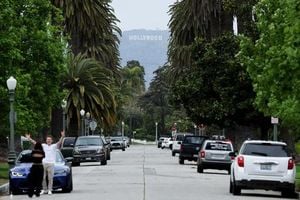Reform UK has made headlines following its recent announcement that only the Union Jack and St George’s flag will be permitted to fly from council buildings under its control. This declaration, made on May 5, 2025, has already sparked outrage among opposition parties and raised questions about the party's priorities in the wake of its recent electoral victories.
After gaining control of ten local authorities in England during the local elections held the previous week, including notable areas such as Durham, Lancashire, and Staffordshire, Reform UK’s chairman Zia Yusuf took to social media to outline the party's new flag policy. He stated, “Reform-controlled English councils will move at speed to resolve that the only flags permitted to be flown on or in its buildings will be the Union Jack and St George’s flag.” Yusuf emphasized that no other flags would be allowed on flagpoles, balconies, reception desks, or council chamber walls.
In a subsequent clarification, a spokesman for Reform UK asserted that while the Union Jack and St George’s flag would be prominently displayed, local county flags would also be permitted. This statement came after concerns were raised regarding the party’s stance on various regional symbols, particularly the Lancashire rose, which Labour MP Chris Webb criticized as a sign of the party’s overreach. Webb remarked, “Reform is off to a great start by banning the Lancashire rose from flying.”
Adding to the controversy, Conservative MP Dr. Luke Evans questioned the implications of the new policy on local identity, specifically asking whether Leicestershire County Council would be allowed to fly its own flag. The Tories recently lost control of Leicestershire County Council, with Reform now being the largest party, albeit without an overall majority. Evans tweeted, “So let me get this straight… Leicestershire County Council would not be able to fly the Leicestershire county flag? Really?”
Moreover, Labour MP Mike Tapp accused Reform UK of banning the Ukrainian flag from public buildings, a move that he labeled as particularly egregious given the timing with VE Day, a day commemorating the defeat of Nazi Germany. Tapp, who has represented Dover and Deal since July 2024, stated, “As VE Day reminds us, Britain has a proud history of working with allies to defeat dictators and tyrants. It tells you all you need to know about Nigel Farage’s Reform that their very first act after winning elections is to ban the Ukrainian flag from our town halls, in this of all weeks.” He further urged the party to reconsider its decision, pointing out that Farage has previously expressed admiration for Russian President Vladimir Putin.
The Reform party's flag policy has drawn accusations of “sucking up to Moscow” from critics, who see the ban on the Ukrainian flag as a troubling indication of the party's political leanings. Tapp remarked, “Farage and Reform councillors should stop sucking up to Moscow and drop their ban on flying the Ukrainian flag immediately.”
In a broader context, the decision to restrict flags at council buildings reflects a growing trend among certain political factions to emphasize national identity over regional or international solidarity. This move has been met with mixed reactions from the public and political commentators, some of whom argue that it undermines local pride and the values of inclusivity.
In response to questions about how the party plans to implement its policies regarding asylum seekers, Reform leader Nigel Farage has vowed to resist housing asylum seekers in areas now under Reform control. When asked how this would be possible given existing agreements between the Home Office and accommodation providers, Zia Yusuf stated that the party would utilize “every instrument of power available,” including judicial reviews and planning laws. This commitment to resist asylum housing has raised eyebrows and further fueled debates about the party's approach to immigration and community integration.
As the political landscape shifts following the recent local elections, the implications of Reform UK's policies will likely reverberate through communities across England. The party's insistence on a narrow interpretation of national symbols and its controversial stance on asylum seekers may alienate some voters while galvanizing others who share its vision.
With the local elections marking a significant milestone for Reform UK, the party's leadership appears determined to carve out a distinct identity, one that prioritizes traditional British values and symbols at the potential expense of broader inclusivity. Observers will be watching closely to see how these policies play out in practice and whether they resonate with constituents in the long term.
The political debates ignited by Reform UK's recent actions underscore the complexities of local governance in a rapidly changing national context. As discussions continue about the role of symbols, identity, and community within the framework of local councils, the party's decisions will undoubtedly shape the narrative of British politics in the months to come.



